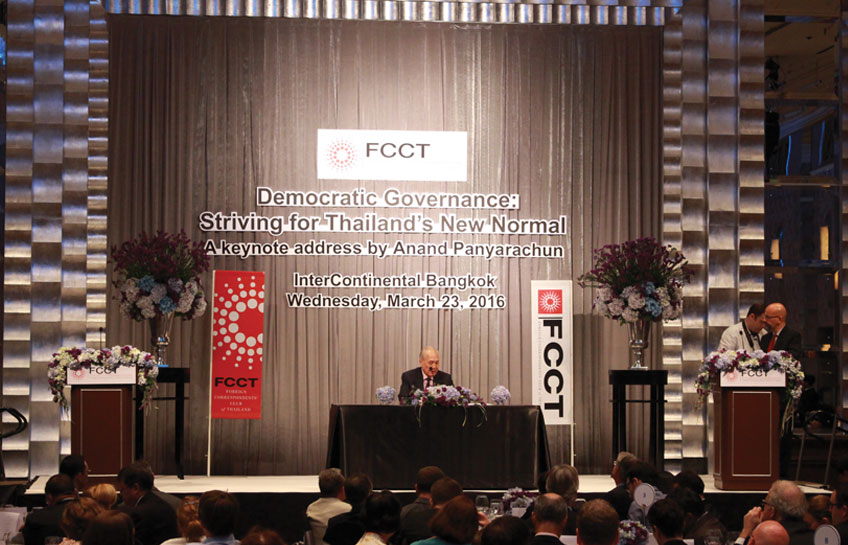Since 1932 when it became a constitutional monarchy, Thailand has been through 12 successful coup d’états, seven attempted ones and 19 constitutions. While the 20th is being drafted, the nation is still struggling for true and enduring democracy.
“Change has always been superficial, old wine in a new bottle – or you could even say old wine in an old bottle but with a new cork. Critically, we have not dug deeply enough to uncover the true underlying cause of current divisions in Thai society,” said Anand Panyarachun at his keynote address “Democratic Governance: Striving for Thailand’s New Normal”, hosted by the Foreign Correspondents’ Club of Thailand in late March at the InterContinental Hotel. The former prime minister had been invited to share his personal vision for a brighter, more inclusive Thai society.
“Thailand is currently at an important crossroads,” he said. “Major changes are occurring in the economic, social and political spheres that will have far-reaching implications for the future of this country.”
The country’s GDP has felt the repercussions of the global economic recession while growth in the tourism and industrial sectors has been hit by political turmoil. Thai people, particularly at the bottom of the pyramid, still yearn for a better quality of life. Considering that the country’s endemic problems are exacerbated by corruption and political instability, we cannot help but question where Thailand is headed.
“What is clear in hindsight is that globalization, consumerism, extravagance, dishonesty and immoderation have led to management failures in both government and business,” Mr Anand said. Overwhelmed by political unrest and external disturbances, the nation is in need of four governance elements for Thailand’s new paradigm.
The first element proposed by this social thinker is respect for “sustainable and widespread economic development”. The consequences of financial crisis – after decades of the country focusing on overall GDP growth rate rather than the quality and fair distribution of income – clearly depicts the debility of the current economic system. Influenced by populism, Thailand’s financial measures are designed for short-term outcomes.
“The first-car purchase and rice-pledging schemes were both examples of short-term stimulus measures. Policies of this kind are pushed by governments the world over to secure quick popular support with inadequate regard for their negative economic repercussions.”
Statistics from past decades indicates that less than 1% of the Thai population owns over 50% of the country’s entire wealth, underlying the gap of income distribution. The former prime minister suggested wealth inequality is not a phenomenon unique to Thailand but occurs almost everywhere regardless of developed or developing status and capitalist or socialist system. The ratio of the income gap is not the root cause; the real culprit is the inequality of the local social system.
With globalization, fair income distribution is more elusive, allowing major benefits to go to the rich while little reaches the bottom of the pyramid. A sustainable and far-reaching economy requires improvement at the foundation by strengthening the competitiveness of enterprises and skilled labour as well as encouraging new research without neglecting the fact that the fruits of economic growth must be shared equitably.














































































































































































































































































































































































































































































































































































































































































































































































































